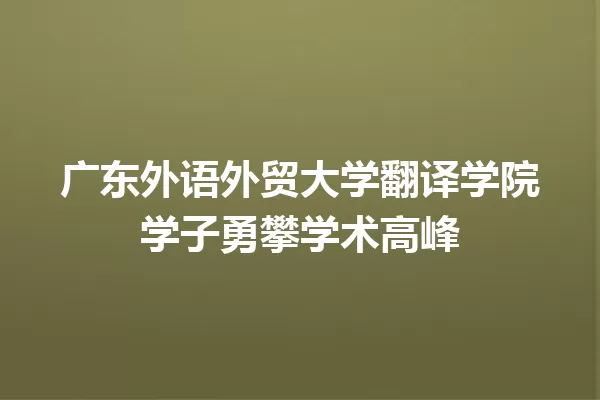
In today’s globalized world, the importance of effective communication across languages cannot be overstated, especially in the realm of international trade. The Guangdong University of Foreign Studies’ School of Advanced Translation is at the forefront of this movement, equipping students with the skills necessary to excel in a competitive marketplace. This article explores the pivotal role that translation studies play in facilitating international business and trade, highlighting the unique challenges and opportunities that arise in this dynamic field.
The Role of Translation in International Trade
Translation serves as a bridge between cultures, enabling businesses to expand their reach and connect with diverse markets. In international trade, accurate and culturally sensitive translations are crucial for several reasons:
The demand for skilled translators in the field of international trade is growing, as companies recognize the value of investing in professional translation services.
Challenges Faced by Translation Students
Students at the Guangdong University of Foreign Studies encounter various challenges as they prepare for careers in translation. These challenges include:
The Impact of Translation Studies on Career Opportunities
Graduates from the School of Advanced Translation are well-prepared to enter the workforce, thanks to a comprehensive curriculum that emphasizes both theoretical knowledge and practical skills. The following table illustrates the various career paths available to translation graduates:
| Career Path | Industry | Skills Required | Average Salary (USD) | Job Growth Rate |
|---|---|---|---|---|
| Freelance Translator | Various | Language Proficiency, Time Management | 40,000
|
10% |
| Localization Specialist | Tech | Cultural Awareness, Technical Skills | 50,000
|
12% |
| Project Manager | Translation Services | Leadership, Communication | 60,000
|
8% |
As the global economy continues to evolve, the need for skilled translators will only increase. The Guangdong University of Foreign Studies is committed to preparing its students for these exciting opportunities, ensuring they are equipped with the knowledge and skills necessary to thrive in the world of international trade.
Cultural knowledge plays a crucial role in translation, particularly within the field of international trade. It’s not enough for a translator to simply convert words from one language to another; they must also grasp the cultural context behind those words. This understanding allows for translations to resonate with the target audience, adhering to their specific customs, values, and business practices. When translations are culturally relevant, companies can better position their products and services in foreign markets, making them more appealing and relatable to potential customers.
Moreover, without a strong grasp of cultural nuances, businesses risk significant misunderstandings. For example, what may be considered a standard marketing strategy in one culture could appear offensive or confusing in another. This misalignment can lead to negative perceptions of a brand, painting it in a unfavorable light due to miscommunication. Thus, having translators who not only excel in the languages involved but also understand the cultural fabric of the audience is indispensable. It’s a fundamental aspect that ensures a company’s message isn’t just heard, but truly understood and appreciated, which is key to successful international engagement.
Frequently Asked Questions (FAQ)
What programs are offered at the Guangdong University of Foreign Studies’ School of Advanced Translation?
The School of Advanced Translation offers various programs focused on translation studies, including undergraduate and master’s degrees, as well as specialized training in legal, medical, and technical translation. These programs are designed to prepare students for careers in international trade and other relevant industries.
How does the curriculum incorporate technology in translation studies?
The curriculum integrates cutting-edge technology by teaching students how to use Computer-Assisted Translation (CAT) tools and machine translation. This ensures they are well-equipped to handle modern translation demands and remain competitive in the job market.
What are the career prospects for graduates in translation studies?
Graduates from the School of Advanced Translation can pursue a wide range of career paths, including freelance translation, localization specialist roles in the tech industry, and project management positions in translation services. The demand for skilled translators is projected to grow significantly, offering strong job security.
How important is cultural knowledge in translation for international trade?
Cultural knowledge is essential in translation for international trade as it ensures that translations are not only accurate but also culturally relevant. Understanding cultural nuances helps businesses communicate effectively and avoid misunderstandings that could affect their brand’s image.
What skills are essential for aspiring translators?
Aspiring translators should develop strong language proficiency, attention to detail, and cultural awareness. Additionally, skills in time management and communication are crucial for meeting deadlines and collaborating with clients or colleagues in the field of translation.
内容结尾插入,支持HTML代码,如果不需要请删除